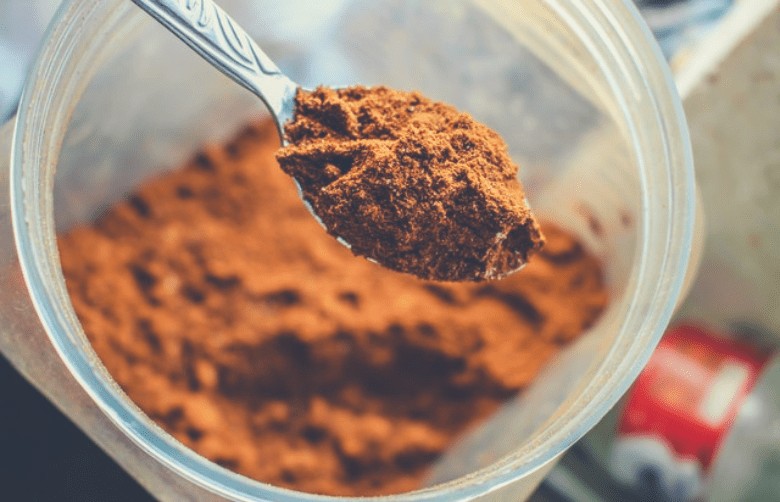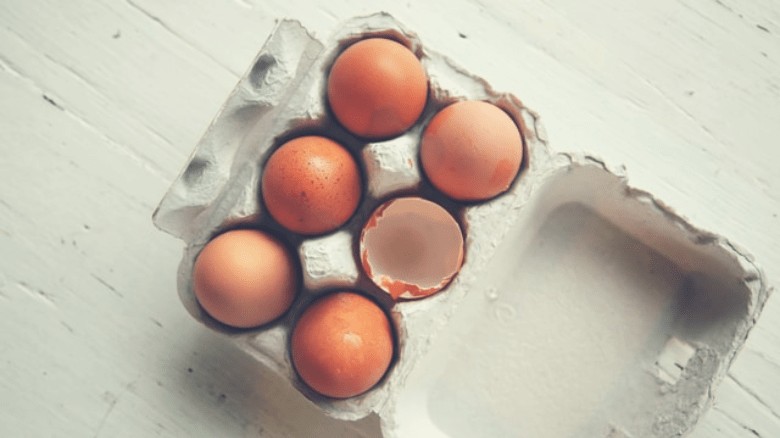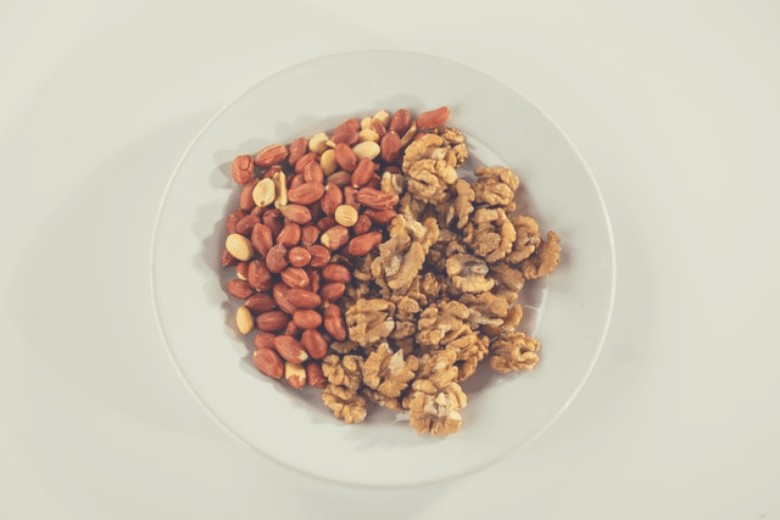If you hang out around the strength-building areas of a gym long enough, you’ll hear conversations about protein powder and muscle gains.
However, you’ll probably see it faster than you’ll hear about it.
Protein powders have become extremely popular for people looking to build muscle, so you’ll find them in every nutrition store and gym around.
Like just about everything you’d consume, protein powders come in different forms or types.
The two types are animal protein powder and plant based protein powder.
While both are great, they each have their advantages and disadvantages. Keep reading to find out more.
How Your Body Uses Protein
Before diving into which type of protein powder is best, you need to know why you would use protein powders at all.
Sure, the general reason is to build muscle, but you can do that in the gym by working out. However, you need protein for a lot of other reasons.
Cellular Functions
Protein is an essential building block that the body uses for many different reasons. Without protein, your body would likely crash and burn.
The hair and nails are an example.
Your hair and nails are mostly made of a strong protein called keratin.
If your body doesn’t have enough keratin, your hair can begin to thin and fall out. Your nails may become brittle and break easily.
Another example is hemoglobin.
This protein is used in conjunction with red blood cells to carry oxygen around your body.
Without enough hemoglobin, your body can develop hypo proliferative anemia (protein deficiency anemia).
This means your body isn’t producing enough of red blood cells to circulate the oxygen around your body.
Protein supports so many other functions in the body that there could be a book written on it (and there probably is one out there).
It’s essential that you get enough protein to keep your body running correctly.
Muscle Building

When people think of protein, it’s usually for the muscle building properties.
Protein helps to build your muscles through amino acids. When you strength train, you cause small tears in your muscles. This sounds painful but it’s a good thing.
Your body repairs these tears and the process by which it repairs the tears causes the muscle to heal to a stronger and thicker state than it was before.
Protein provides the amino acids that are needed to repair those tears.
Note that protein alone doesn’t build muscles. You need to have a good strength training routine in place, otherwise there is nothing for protein to repair.
Your Body’s Protein Supply
With proteins doing all this work in your body, it’s understandable that you need a big supply of it.
Surprisingly, your body doesn’t create protein. You must get it from food sources.
Right about now, it should be clicking in your head why you need protein powder.
You can get protein from the food you eat. Lean meats like chicken and turkey are great sources.
However, food will likely only provide you with enough protein to live – basically to support your cellular functions.
When you strength train, you need more protein, especially if you plan to go hard. That’s where protein supplements come in.
They provide you with the additional protein that you need to support strength training and muscle building.
Who Can Benefit from More Protein?
Based on the information that was just given to you, it’s clear that not everyone needs to consume protein powder.
It’s only needed for people who are trying to build muscles or people who may not consume protein on a regular basis.
For example, the average senior citizen won’t need extra protein.
People who can benefit from extra protein include:
- Teenagers – they are growing exponentially and could use the boost.
- Bodybuilders – for all the reasons already discussed.
- Athletes – they’re not bodybuilders, but their training includes a lot of strength training.
- Vegans – they don’t consume regular protein sources so protein powder can fill that void.
- Gym Newbies – when you first start working out, your muscles are going to be shocked, torn, and bullied. You’ll need protein to recover.
- Rehab Patients – recovering from an injury requires a steady supply of amino acids. Protein can help with this significantly.
Now that you know how protein helps you, we can compare the different types of protein powder.
Keep reading to find out if animal protein powder is better for you or if plant based protein powder is better.
Animal Protein Powder vs. Plant Based Protein Powder

These protein powders are exactly what they sound like.
One comes from animals while the other one comes from plants.
While both sources provide you with protein, there are some major differences that would make you choose one over the other.
Each protein source has different types, and each type has their own individual pros, but in this section I’ll go over some general pros for each one.
Animal Protein Pros & Cons
Pros
Animal protein provides what is called complete protein.
This means that it contains all nine of the essential amino acids (except for collagen protein powder).
This is great because the human body doesn’t produce these nine amino acids, so they must be derived from outside sources.
Animal protein powder tends to have a better taste than plant protein powder. It also blends easier so it’s less frustration when making it into a drink.
Cons
Some people may be allergic to dairy or may be lactose intolerant, so some animal proteins may not be suitable for them.
Animal protein powder may also be a little more difficult for the body to digest.
Animal based protein powders can have a high cholesterol content. If you have problems with cholesterol, you should avoid this type of protein powder.
Plant Protein Pros & Cons
Pros
Plant proteins are easier for the body to digest. Even if you aren’t lactose intolerant, dairy and red meats have been known to throw off your digestive system.
Plant based proteins don’t do this.
Plant proteins tend to be lower in calories and fat than animal proteins. Consuming plant proteins makes it easier to stick with a low-calorie and low-fat diet.
If you’re vegetarian, vegan, or lactose intolerant, plant proteins are for you. They allow you to get the protein you need without compromising your lifestyle.
Plant based protein powders don’t have cholesterol so people with high cholesterol can safely use this type of powder.
Cons
Some people don’t like the texture and taste of plant proteins. They tend to be coarser and have an “earthy-like” taste. The texture also makes it harder to dissolve in liquids.
Another consideration is that you must be careful to make sure the plants that were used for the supplement are non-GMO (genetically modified organism).
These days, soy is almost always a GMO plant in supplements. In fact, over 80% of the global supply of soy is GMO.
The good news is that 85% of the GMO supply is fed to farm animals. Actually, that might not be good news depending on how you look at it.
If you’re looking for a rice protein that absorbs 30% faster than whey, we recommend this one.
Types of Animal Protein Powder

Whey
Whey protein powder is made from a cheese byproduct. It’s the most popular protein powder out of both animal and plant based powders.
This is because research has shown that it’s more effective at muscle gains than the others.
The efficiency is due to the high branched chain amino acid (BCAA) content.
It’s the highest source of leucine, the BCAA that builds muscle the most. These three amino acids are a powerhouse when it comes to muscle building.
Whey protein powder is easily absorbed by the body. It only takes around 20 minutes for it to be absorbed.
However, it does contain a significant amount of lactose so it’s not good for lactose intolerant or dairy-sensitive people. It can also decrease your appetite.
Casein
Casein also comes from a cheese byproduct.
It’s a little different from whey protein powder because it’s absorbed more slowly by the body. It can take up to four hours for it to be absorbed.
Casein also has slightly less BCAAs.
You may wonder why people would choose casein over whey if whey works faster and has more BCAAs.
This is because casein slows the breakdown of muscles since it provides a steadier stream of amino acids.
This allows your body to synthesize proteins faster than muscle breakdown will occur.
If you need the benefits of protein powder instantly, such as after an intense workout, whey protein is the best choice.
Otherwise, if you can give the supplement more time to work, such as when you’re fasting or sleeping, casein is the better choice.
Egg
Egg protein powder is made from egg whites, so you may not feel as full after ingesting it as you would with other protein supplements.
However, it has the second-highest amount of leucine and is a great option for people who are allergic to dairy products.
Egg protein powder blends very easily and has a neutral taste compared to the others. It does a great job at providing you with the protein you need.
Collagen
Collagen is a newer type of animal based protein powder. It’s made from bones and cartilage. It doesn’t have all nine amino acids and the efficiency at muscle building hasn’t been fully studied yet.
However, it’s excellent for improving skin, hair, nails, and joints. It blends well and has a neutral taste.
Types of Plant Based Protein Powder

Brown Rice
Brown rice protein powder provides you with a decent amount of eight out of nine essential amino acids.
It technically has some of the ninth amino acid – lysine – but it’s not enough to really count it.
Sometimes manufacturers will combine brown rice protein powder with another plant based powder to make up for the lack of lysine.
Brown rice protein powder is good for aiding with weight loss.
Hemp
Hemp is not a very popular protein powder because it has low levels of leucine and lysine.
However, it’s very easy to digest.
It only has a trace amount of THC (the psychoactive component in marijuana). It’s not suggested to use hemp alone for muscle building, but it may be effective if you mix it with another plant based protein powder.
Pea
Of all the plant based protein powder sources, pea protein powder is the superior choice.
It’s absorbed faster than casein powder, but slower than whey.
It’s rich in BCAAs and is only missing one essential amino acid (lysine).
This powder is made from the yellow split pea. It’s high in fiber so it will keep you full longer. It also has a manageable taste.
So, Which Type Is Better?
The real answer to this question depends on what you need out of a protein powder. However, if you take away all restrictions, animal protein powder is the better choice.
Animal protein powder has all the essential amino acids (and a good amount of all of them).
It works faster and more efficiently. It’s more direct in providing you with the benefits you’re seeking from a protein powder.
It’s true that animal protein powder is higher in fat and cholesterol than plant based protein powder.
If you’re on a low-fat diet or you have high cholesterol, you may want to stick with egg protein powder.
Since this is made from egg whites, it will have little to no cholesterol and a low fat content.
Animal protein powder may be better, but both types of protein powder will aid you in your fitness goals.
So, choose your favorite, use it wisely, and get those muscle gains.


